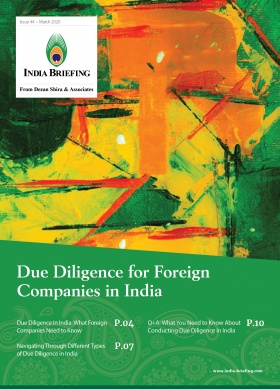India’s Position on Taxing Foreign Digital Economy Firms
For an update on India’s digital tax liability, please see our article here: India Not to Levy Digital Tax on Offshore E-Commerce Firms with Indian Arm.
Starting April 1, this year, India has been levying a two percent tax on e-commerce firms. This was introduced through the Finance Act, 2020.
Further, on October 28, the Central Board of Direct Taxes (CBDT) notified the Equalisation Levy (Amendment) Rules, 2020 to further amend the Equalisation Levy Rules, 2016. The equalisation levy is a tax on specified services or e-commerce supply or services provided by non-residents to local consumers by means of a digital platform or through internet or telecommunication networks.
India first implemented an equalisation levy in 2016, when it charged a six percent withholding tax on payers of online sale of advertisements – applicable to non-resident technology firms like social media platforms that targeted Indian consumers.
The introduction of the equalisation levy (and its subsequent expansion) follows from the recommendations of the BEPS (Base Erosion and Profit Shifting) Action Plan. It allows the Indian government to explore an untapped source of revenue as previously, foreign e-commerce firms were able to access the vast Indian market but not pay any tax on earnings or profits.
As per its latest filings, Google India reportedly paid tax authorities INR 6.04 billion (US$82.14 million) as digital tax in FY 2020. This was around 55 percent of the INR 11 billion (US$149.59 million) in equalisation levy paid by technology companies in India in the digital advertising domain.
This article briefly explains India’s digital tax or equalisation levy and its expansion.
Digital tax on foreign e-commerce companies
From April 1, 2020, foreign e-commerce businesses must pay a two percent service tax to the Indian government.
The law stipulates that on and from April 1, 2020 – an equalisation levy will be charged at the rate of two percent of the amount of consideration received or receivable by an e-commerce operator from e-commerce supply or services made or provided or facilitated by it:
- to a person resident in India; or
- to a non-resident in the specified circumstances – sale of advertisement (which targets a customer who is resident in India or a customer who accesses the advertisement though internet protocol address located in India) and sale of data (collected from a person who is resident in India or from a person who uses internet protocol address located in India); or
- to a person who buys such goods or services or both using internet protocol address located in India.
This is in addition to the equalisation levy charged at the rate of six percent of the amount of consideration for any specified service received or receivable by a person, being a non-resident from:
- a person resident in India and carrying on business or profession; or
- a non-resident having a permanent establishment in India.
However, in the case of the equalisation levy on specified service (digital advertising) – the resident payer is responsible for deducting and paying the levy. This is unlike the digital tax on e-commerce operators, who are themselves required to make the payment, on a quarterly basis.
How to pay the tax
To enable payment, the tax department amended the challan (receipt) ITNS 285 that is used to pay the levy online – by including e-commerce operator for e-commerce supply or services under the type of deductor category. The e-commerce entity will need to furnish their permanent account number (PAN). The payee also has the option to select ‘Outside India’ when providing the address details.
Eligibility
Turnover: It is imposed on foreign e-commerce companies that have a turnover or sales of over INR 20 million in the previous year.
Definition of e-commerce operator: For purpose of the tax payment, the income tax department defines an e-commerce operator as a (non-resident) who owns, operates, or manages digital or electronic facilities or platforms for the online sale of goods or online provision of services or both. As such, e-commerce supply or services means:
- Online sale of goods owned by the e-commerce operator;
- Online provision of services provided by the e-commerce operator;
- Online sale of goods or provision of services or both, facilitated by the e-commerce operator; or
- Any combination of activities listed in the above clauses.
This wide-ranging definition means that the e-commerce operator could be an online shopping portal, or a gaming platform, or an entertainment streaming service provider, etc.
Definition of specified services: Further, by specified services, the income tax department means online advertisement, any provision for digital advertising space, or any other facility or service for the purpose of online advertisement and includes any other service as may be notified by the Central Government.
Due dates and compliance
The due dates for tax payment are as follow:
- Quarter ending June: July 7
- Quarter ending September: October 7
- Quarter ending December: January 7
- Quarter ending March: March 31
The due date for compliance – that is filing the Equalisation Levy Statement (Form No.1) is on or before June 30. Penalty will be charge for incompliance and delayed payment of levy. If the statement filed is false, the person may even get imprisoned for a term up to three years and be charged a fine.
What does the 2020 amendment to the Equalisation Levy Rules stipulate?
The 2020 amendment expands the scope of the 2016 equalisation levy and states “the assessee or e-commerce operator, as the case may be” will be “required to deduct and pay equalisation levy duly remitted to the Reserve Bank of India or any branch of the State Bank of India or any authorized Bank accompanied by an equalisation levy receipt (challan).”
The amendment also modifies Form No.1, which is electronically filed when furnishing the statement of specified services or e-commerce supply or services. The 2020 Amendment Rules also explain the purpose and procedure of the electronic verification code as well as the method to revise the statement, if so required. The electronic verification code refers to a code that gets generated digitally to verify the person furnishing the statement of specified services as per the data structure and standards laid down by the Principal Director-General of Income-tax (Systems) or Director General of Income-tax (Systems), as the case may be.
What is India’s position on the digital tax and will there be a roll-back?
India’s decision to tax e-commerce firms is similar to plans by European nations like France and Britain to tax the offshore digital economy that caters to their local consumers through electronic means. In the ASEAN region, Singapore, Indonesia, and Malaysia all impose a digital service tax with Thailand announcing forthcoming plans to tax its foreign digital service providers.
However, the US has launched an investigation into whether these digital taxes imposed by India and about nine other countries discriminate against US-based companies.
Perhaps responding to these issues, a recent statement made by Rasmi Ranjan Das, joint secretary in the finance ministry, is illuminating. Das said that the specific and individual steps taken by India and other countries to tax digital economy firms indicated that the existing international taxation rules are not adequate to address the concerns around the erosion of tax base. He was also of the opinion that such unilateral measures would be withdrawn when and if global consensus is reached on how to tax income generated by offshore technology firms.
Meanwhile, India, alongside the G20 and BRICS nations, is working towards evolving such a global taxation framework that will apply to technology companies. The need for such taxation rights is inevitable as the growth of the digital economy is unstoppable and will increasingly replace and/or enhance traditional business. The most visible examples are the online marketplace, gaming, banking and finance, and entertainment platforms, the Internet of Things, etc.
About Us
India Briefing is produced by Dezan Shira & Associates. The firm assists foreign investors throughout Asia from offices across the world, including in Delhi and Mumbai. Readers may write to india@dezshira.com for business support in India.
- Previous Article India’s Public Holidays in 2021
- Next Article India Eases Qualification Norms for Independent Directors








